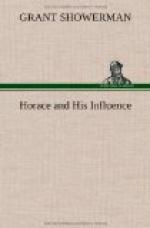Horace is not an Ovid, with no sense of the limits of either indulgence or expression. He is not a Catullus, tormented by the furies of youthful passion. The flame never really burned him. We search his pages in vain for evidence of sincere and absorbing passion, whether of the flesh or of the spirit. He was guilty of no breach of the morals of his time, and it is likely also, in spite of Suetonius, that he was guilty of no excess. He was a supporter in good faith of the Emperor in his attempts at the moral improvement of the State. If Virgil in the writing of the Georgics or the Aeneid was conscious of a purpose to second the project of Augustus, it is just as likely that his intimate friend Horace also wrote with conscious moral intent. Nothing is more in keeping with his conception of the end and effect of literature:
It shapes the tender and hesitating speech of the child; it straight removes his ear from shameless communication; presently with friendly precepts it moulds his inner self; it is a corrector of harshness and envy and anger; it sets forth the righteous deed; it instructs the rising generations with the familiar example; it is a solace to the helpless and the sick at heart.
iv. LIFE AND PURPOSE
Horace’s philosophy of life is thus based upon something deeper than the principle of seizing upon pleasure. His definition of pleasure is not without austerity; he preaches the positive virtues of performance as well as the negative virtue of moderation. He could be an unswerving follower and guardian of true virtue, and could bend self to circumstance.
He stands for domestic purity, and for patriotic devotion. Dulce et decorum est pro patria mori,—to die for country is a privilege and a glory. His hero is Regulus, returning steadfastly through the ranks of protesting friends to keep faith with the pitiless executioners of Carthage. Regulus, and the Scauri, and Paulus, who poured out his great spirit on the disastrous field of Cannae, and Fabricius, of simple heart and absolute integrity, he holds up as examples to his generation. In praise of the sturdy Roman qualities of courage and steadfastness he writes his most inspired lines:
The righteous man of unswerving purpose is shaken in his solid will neither by the unworthy demands of inflamed citizens, nor by the frowning face of the threatening tyrant, nor by the East-wind, turbid ruler of the restless Adriatic, nor by the great hand of fulminating Jove himself. If the heavens should fall asunder, the crashing fragments would descend upon him unterrified.
He preaches the gospel of faithfulness not only to family, country, and purpose, but to religion. He will shun the man who violates the secrets of the mysteries. The curse of the gods is upon all such, and pursues them to the day of doom.
Faithfulness to friendship stands out with no less distinctness. While Horace is in his right mind, he will value nothing so highly as a delightful friend. He is ready, whenever fate calls, to enter with Maecenas even upon the last journey. Among the blest is he who is unafraid to die for dear friends or native land.




